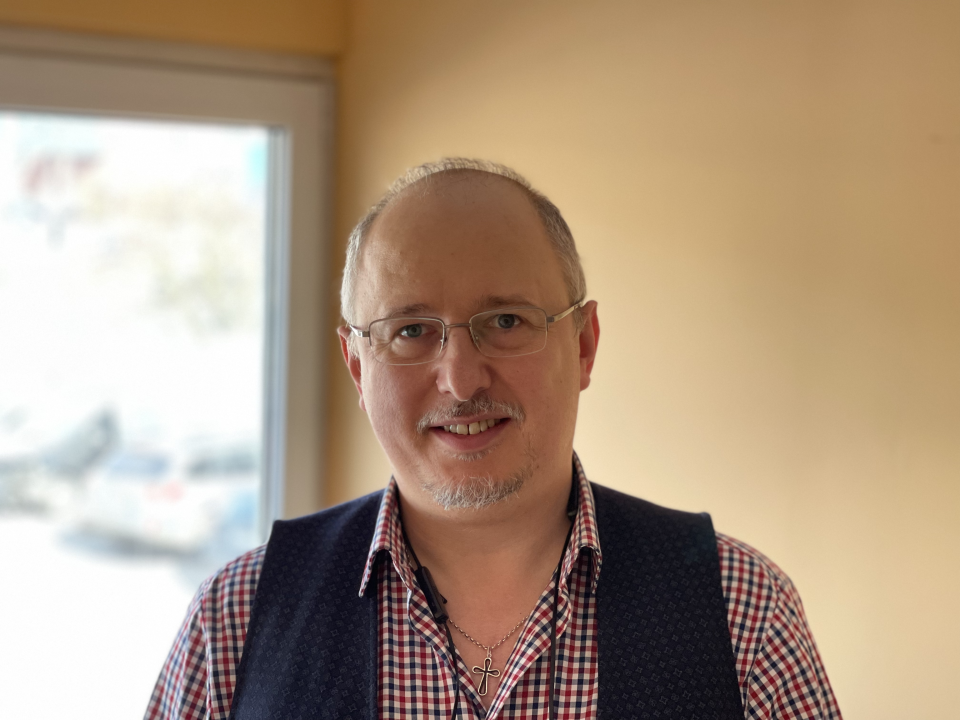Ukraine's volunteer online army: Meet the ‘cyber elves’ fighting Russian trolls on Facebook
When Henrikas Savickis is not performing at the National Theater or strumming a guitar with his drama students, this 51-year-old actor, singer and teacher from the Lithuanian city of Kaunas has an unusual side hustle. He’s a keyboard warrior on the frontlines of the Russian offensive in Ukraine.
For four to five hours a day since the invasion began, Savickis fires up his laptop to shoot down pro-Kremlin conspiracy theories and falsehoods spread by Russian operatives who camouflage their activities by posing as Lithuanian citizens.
The battlefield is Facebook, the most popular social media platform in central and eastern Europe. Savickis says his mission is to defeat Russian-paid Lithuanians, Russian-deployed bots and “useful idiots” who unwittingly spread Russian lies meant to divide the Lithuanian people and weaken support for Ukraine.
RUSSIAN SANCTIONS: Where US, allies have targeted the dozens of sanctions against Russia
UKRAINE REDUCED TO RUBBLE: These heartbreaking images explore Ukraine's devastated residential areas
Meet Ukraine’s volunteer online army. Savickis is one of tens of thousands who’ve joined a grassroots, pro-democratic mission to defeat Moscow’s information warfare machine.
These unlikely combatants call themselves “elves,” and they hunt Russian trolls and expose Kremlin propaganda and disinformation efforts. Some elves counter Russian talking points with credible information gathered from allies on the ground in embattled parts of Ukraine.
“I saw how easily Crimea surrendered, and it happened due to Russian propaganda that brainwashed them years before the invasion,” said Savickis, who began monitoring Facebook eight years ago when Russia invaded and annexed the Crimean Peninsula. “I understood that it can happen to us, too, if we do not withstand this dangerous information that was flooding our social media too.”
Ukraine resistance fighters battle Russia on Facebook
Adéla Klečková, a cybersecurity consultant and freelance writer who researched the elves for the German Marshall Fund, says they are playing an essential role in the current conflict.
That role, she said, will become only more critical as these operations grow in number and sophistication and relations between Russia and the West continue to sour.

Disinformation is a critical part of Russian military doctrine and has been since the Soviet era, according to Terry Thompson, who lectures on cybersecurity at Johns Hopkins University and the University of Maryland.
Russia spreads “Pro-Russia, anti-everybody else propaganda” on social media to shape people’s world views and sway global events, including the 2016 U.S. presidential election, according to Thompson.
In the 1980s, the KGB and the East German Stasi launched a campaign known as “Operation Denver” that planted articles using forged documents and false expert testimony to blame HIV on secret biological warfare experiments carried out by U.S. military scientists at Fort Detrick in Maryland.
“Today, they don’t have to leave their couch,” Thompson said. “They can do it right from Moscow or St. Petersburg.”
Russian operatives typically use five D’s: distort, distract, dismiss, deny and dismay, according to Larissa Doroshenko, a postdoctoral teaching associate at Northeastern University.
“Disinformation is not just about fake news or false information. It’s also about more subtle narratives meant to distract us from what's going on or to dismay us,” said Doroshenko who studies the use of disinformation by authoritarian regimes.
The Kremlin has unleashed these tactics during the Ukraine invasion, says Shelby Grossman, a research scholar at the Stanford Internet Observatory.
“Meta recently suspended an inauthentic Instagram operation spreading false information that Ukrainian refugees in Poland have committed hundreds of crimes. Unattributed Telegram channels are claiming Western supporters of Ukraine are untrustworthy, that Ukraine is destroying infrastructure to prevent refugees from fleeing, that Western NGOs are paying for false evidence of Russian war crimes,” Grossman said. “We also continue to see false flag allegations, for example incorrect claims that Ukraine was planning to invade the Donbas region.”
Zelenskyy beating Russia in information war
The United States, European Union and NATO as well as social media companies have struggled to contain state-sponsored or sanctioned disinformation and propaganda, but have made strides. And, while under siege from the Russian military, Ukraine has largely beaten Russia at its own information game.
Video clips shot on a mobile phone of Ukrainian president Volodymyr Zelenskyy, unshaven and in army-green T-shirt, cast the onetime TV actor as a global folk hero.
Pro-Ukrainian social media posts and memes including gripping accounts of the invasion’s devastation have captivated the world and generated immense public sympathy.

Volunteer elves in the Baltic states are doing their part by debunking false claims. No, victims of an attack on a Ukrainian hospital were not paid actors. Russian-based separatists, not Ukrainians, shelled a kindergarten.
“Somebody needs to establish what objective reality is, what objective truth is, and more than anything that is what the elves do,” Thompson said. “That’s their core mission: Finding out what the real truth is and exposing the disinformation, the gaslighting and the lies. We need that now more than ever.”
Europe unites to take on Russia: 'Everybody can be an elf'
In 2013, Ričardas Savukynas, a management consultant from Vilnius, Lithuania, says he uncovered dozens of Facebook groups on a wide range of topics, all with the same administrators and all with a pro-Russian slant.
Similar groups soon popped up in Ukraine, interspersing seemingly innocuous posts on alternative medicine or GMO-free food with falsehoods about the Ukrainian uprising on Kyiv’s Maidan Square. Among them were allegations that the protests were the work of the CIA or NATO and that the protestors were neo-Nazis. The Facebook groups also pledged fealty to former pro-Moscow Ukraine president Viktor Yanukovych, who was ousted by the uprising in 2014.

Savukynas realized the Russians were using these Facebook campaigns to lay the groundwork for war.
“Then, the Russian invasion started,” he said, and “those groups started being hyperactive.”
Savukynas blames the “enormous amounts of messages with really blatant fakes and lies” for Ukrainians in some regions turning on their own country.
RUSSIA ELECTION INTERFERENCE: We read every one of the 3,517 Facebook ads bought by Russians. Here's what we found
RUSSIA EXPLOITS RACE TENSIONS: Russian Facebook ads inflamed Hispanic tensions over immigration after Trump election
He and his friends banded together to report the Facebook accounts, pages and groups. They operated from a Facebook group that appeared to be devoted to fans of Yorkshire terriers.
“Imagine Kremlin trolls saying ‘we are being attacked by little Yorkies,’” Savukynas said.
At first, they numbered a dozen or two. Soon hundreds, then thousands of Lithuanians from all walks of life joined up, Savukynas said.
“The idea is, everybody can be an elf simply by fighting against propaganda, against lies,” he said. “Somebody said at that time that we are fighting Russian trolls, so we are elves.”
Elves battle extremism, dark forces on the internet
The moniker stuck, and the underground resistance movement gathered momentum. Today, this loosely affiliated network of organizations operates in 13 countries across Europe, focusing on extremism and other dark forces on the internet, Klečková says.
As part of her research, Klečková worked as an elf for a week. She came away understanding why so many elves seek therapy and why one even suffered a mental breakdown.

The work, Klečková said, demands “a tremendous amount of resilience.”
“Every horrible thing you can think of, it was there,” she said. “After a week, I was suffering from such a great depression. It was so daunting, every single day to be faced with the darkest part of human souls and the darkest part of the internet. After a week, I was so happy this purgatory was over.”
From Lithuania to the Czech Republic, elves are at war with Russian trolls
In the Czech Republic, elves monitor disinformation, analyze data and produce reports on the most dangerous narratives.
As a movement, the Czech elves are independent and apolitical, united only by their pro-democracy beliefs, according to spokesman Bohumil Kartous. Elves are unpaid and cover their own costs.
"We try to cover disinformation activities in (the) Czech digital space, especially those bearing signs of Kremlin propaganda and attacking democratic institutions and principles," Kartous told USA TODAY.
Like in the Hollywood film “Fight Club,” the first rule of being an elf is you don’t talk about being an elf.
“Many people in central and eastern Europe are encountering these cyber elves without knowing it,” Klečková said.

Among them is a Czech 37-year-old mother of two who is battling Russia 30 hours a week on top of the 45 hours a week she puts in at her day job.
“Duty oriented” and highly skilled professionals from doctors to data scientists formed the organization in 2018, she said.
The group operates anonymously except for two spokespeople to protect members and their families from Russian military intelligence and other threats, the Czech elf said. She spoke with USA TODAY on condition of anonymity for security reasons.
She lives in a region heavily influenced by Russia. Only a few close friends are aware of what she does in the late night hours.
In the months leading up to the invasion of Ukraine, she says she could tell from the data the elves were collecting that war was imminent, making their work more important than ever. Volunteers came forward as pro-Russian propaganda and disinformation flooded social media.
Russian propaganda overtakes COVID-19, masks
Prior to the Feb. 24 invasion, disinformation in the Czech Republic mirrored Kremlin talking points: Russia is the victim of NATO and U.S. escalation in Ukraine; Russia has no plans to go to war against Ukraine; and neo-Nazis in Ukraine are killing their own citizens, said Monika Richter, head of research and analysis at Semantic Visions.
According to Semantic Visions, a Prague-based digital intelligence firm, Russian disinformation in the Czech Republic proliferated so rapidly before the invasion of Ukraine, it overtook COVID-19 as the main topic of disinformation.
"Since the invasion, Czech disinformation sources have intensely doubled down on their demonization of Ukraine and its government (e.g., that Kyiv is conducting a genocide of ethnic Russians and Russian speakers in Ukraine) and on these grounds explicitly sought to justify Russia’s 'special military operation' to 'denazify and demilitarize' the country," Richter said in an email.
The Czech elf says she watched as, overnight, COVID-19 groups that previously trafficked in anti-mask and anti-vaccination rhetoric threw their support behind the invasion of Ukraine, peppering their Facebook pages with falsehoods and conspiracy theories.
She worries most about anti-immigration messaging and other appeals intended to turn public sentiment against Ukraine. Particularly effective are claims that Ukrainians streaming across borders are not refugees from the war but wealthy, iPhone-wielding opportunists pilfering Czech resources at a time when food and gas prices are soaring. The elves debunk the posts while issuing their own appeals for displaced Ukrainians who’ve lost almost everything.
At the bottom of a recent report, the elf says she added a short note: “I am super scared.” A fellow elf replied: “I am super scared, too.”
“This is something we know we have to do. No one else is doing it,” she said of the elves’ work. “At least we are together. I don't feel all alone in this.”
This article originally appeared on USA TODAY: Facebook fight for Ukraine: 'Cyber elves' take on Russian trolls

